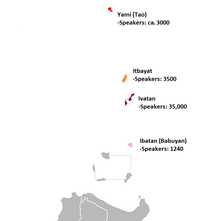Wikijunior:Languages/Ivatan
What writing system(s) does this language use?
[edit | edit source]Ivatan and almost all of the languages in the Philippines are written using the Latin alphabet.
| Upper case | A | B | C | D | E | F | G | H | I | J | K | L | M | N | Ñ | NG | O | P | Q | R | S | T | U | V | W | Z | X | Y | Z |
|---|---|---|---|---|---|---|---|---|---|---|---|---|---|---|---|---|---|---|---|---|---|---|---|---|---|---|---|---|---|
| Lower case | a | b | c | d | e | f | g | h | i | j | k | l | m | n | ñ | ng | o | p | q | r | s | t | u | v | w | x | y | z |
The Ivatan alphabet includes all of the same letters we use in English, along with 'Ñ' (enye), which the Filipinos borrowed from the Spanish, and 'Ng', a digraph already available as a single character in Baybayin.

Engraved — to carve into a material.

Colonize — to migrate and settle a place and occupy as a colony.

digraph — when two letters are used to show one sound.
How many people speak this language?
[edit | edit source]There are 33,000 native speakers of Ivatan language.
Where is this language spoken?
[edit | edit source]
Ivatan is a Philippine language of Austronesian origins spoken in the Batanes Islands of the Philippines.
What is the history of this language?
[edit | edit source]Ivatan is an Austronesian Language. It was thought that the Austronesian language came from Taiwan and migrated southwards through sailing. They first reached Batanes islands, by around 2200 BCE.
Who are some famous authors or poets in this language?
[edit | edit source]Ivatan language doesn't have any writers at all.
What are some basic words in this language that I can learn?
[edit | edit source]| Responses | |
|---|---|
| on | yes |
| umba | no |
| siguro | probably, perhaps |
| Mga Pagbati | Greetings |
| Kapian ca pa nu dios, ara ka mangu? | Hi, how are you? |
| Taytu aco a mapia, dios mamajes. | I'm fine, thank you. |
| Kapian ka pa nu Dios sichamavukas. | Good morning. |
| Kapian ka pa nu dios maraw. | Good midday. |
| Kapian ka pa nu dios sichamakuyab. | Good afternoon. |
| Kapian ka pa nu dios sichamahep. | Good evening. |
| Ngayan mo? | Where are you going? |
| Dios mamajes | Thank you |
| Dios mavidin. | Good-bye. |
| Basic phrases | |
| Mañinglish ka? | Do you speak English? |
| Makey ako no . . . | I like . . . |
| Makey ako ava . . . | I don't like . . . |
| U ngaran ko am . . . | My name is . . . |
| Angu ngaran mo? | What's your name? |
| Numero | Numbers |
| asa | one |
| dadwa | two |
| tatdo | three |
| apat | four |
| dadima | five |
| anem | six |
| papito | seven |
| wawajo | eight |
| sasyam | nine |
| sapujo | ten |
| Counting Units | |
| yatus | hundred |
| ribo | thousand |
| milyon | million |
What is a simple song/poem/story that I can learn in this language?
[edit | edit source]Madahet i Mata Mo is an Ivatan folksong.
Madehet i mata mo, as madahet i punta mo,
mayanahu diyaken a dubgduhen
a duahen du vahay a dimakapipidwa
du araw a dumibu du minadiyisirap
a takey ni ama mo, as takey ni loyna mo,
du dichud nu rasayan, as dimakagurugud
su daun nu vinuwa as dimakavadichid
su ichan ko a yuyuno du kaha ko a mavakes.
References
[edit | edit source] |
Wikijunior:Languages | edit | |
|
Introduction •
Glossary •
Authors and Contributing •
Print Version
| |||
